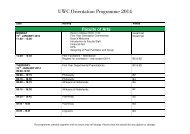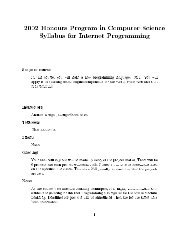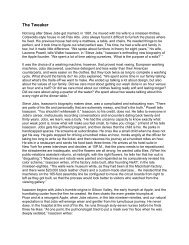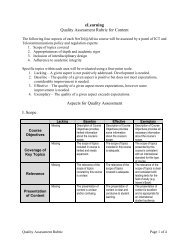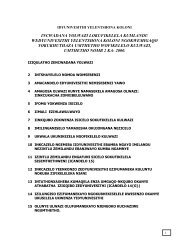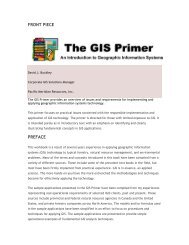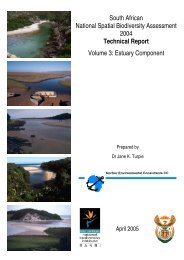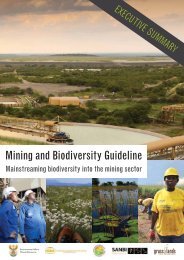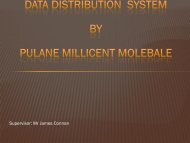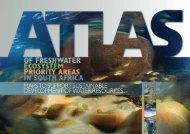Ecosystem Guidelines for Environmental Assessment
Ecosystem Guidelines for Environmental Assessment
Ecosystem Guidelines for Environmental Assessment
Create successful ePaper yourself
Turn your PDF publications into a flip-book with our unique Google optimized e-Paper software.
FRESHWATER<br />
What are the key issues, vulnerabilities and threats<br />
Lack of knowledge of how systems function; their biodiversity and the nature of their links to other<br />
systems.<br />
Infilling/direct loss of aquatic habitats.<br />
Drainage of wetlands.<br />
Separation from up- and downstream systems - e.g. source areas, seepage lines, drainage corridors.<br />
Changes in water table (increases and decreases in level and changes in quality).<br />
Removal or degradation of indigenous vegetation in the system.<br />
Catchment hardening (loss of catchment habitat and ability to absorb flows, and increased<br />
stormwater runoff), encroachment, fragmentation/loss of corridors.<br />
Insufficient buffering between existing systems and developments.<br />
Over-abstraction from:<br />
- surface water<br />
- groundwater<br />
Impoundment, including deliberate trans<strong>for</strong>mation<br />
of wetland types to fulfil aesthetic or<br />
social demands, e.g. changing seasonal wetlands<br />
into open water habitat. As a general rule, the drier<br />
the wetland type, and the more seasonal it is, the<br />
more vulnerable it is to development impacts -<br />
particularly so as the drier seasonal wetlands may<br />
often be important habitats.<br />
Introduction to the system of:<br />
- terrestrial alien and invasive vegetation,<br />
including bulrush Typha capensis<br />
- aquatic alien vegetation<br />
- alien fish and other animals<br />
Pollution sources affecting water quality and<br />
water quantity (e.g. stormwater runoff, discharge<br />
from wastewater treatment works).<br />
Aesthetic degradation (e.g. litter) leading to generalised<br />
degradation (e.g. dumping of soil or rubble).<br />
Emphasis on development that compromises longterm<br />
ecosystem functioning.<br />
Wise use of farmland can support<br />
wetland conservation in the Western Cape.<br />
Unrealistic expectations, coupled with insufficient<br />
knowledge of how wetland systems function, that artificial wetlands can be created to off-set wetlands<br />
lost to development.<br />
Subjective expectations that eclipse knowledge of ecological function: e.g. trans<strong>for</strong>mation of<br />
seasonal wetlands into open water ponds or "lakes" to fulfil aesthetic, commercial or social imperatives.<br />
BOTANICAL SOCIETY OF SOUTH AFRICA<br />
What are the “bottom lines” and non-negotiables<br />
All wetlands have conservation significance, in terms of habitat type, and/or cumulative or singular<br />
functional value.<br />
Flow regimes must be able to maintain the wetland at its present extent and habitat quality, as well<br />
as downstream ecosystems.<br />
70 : FRESHWATER ECOSYSTEMS - WETLANDS



